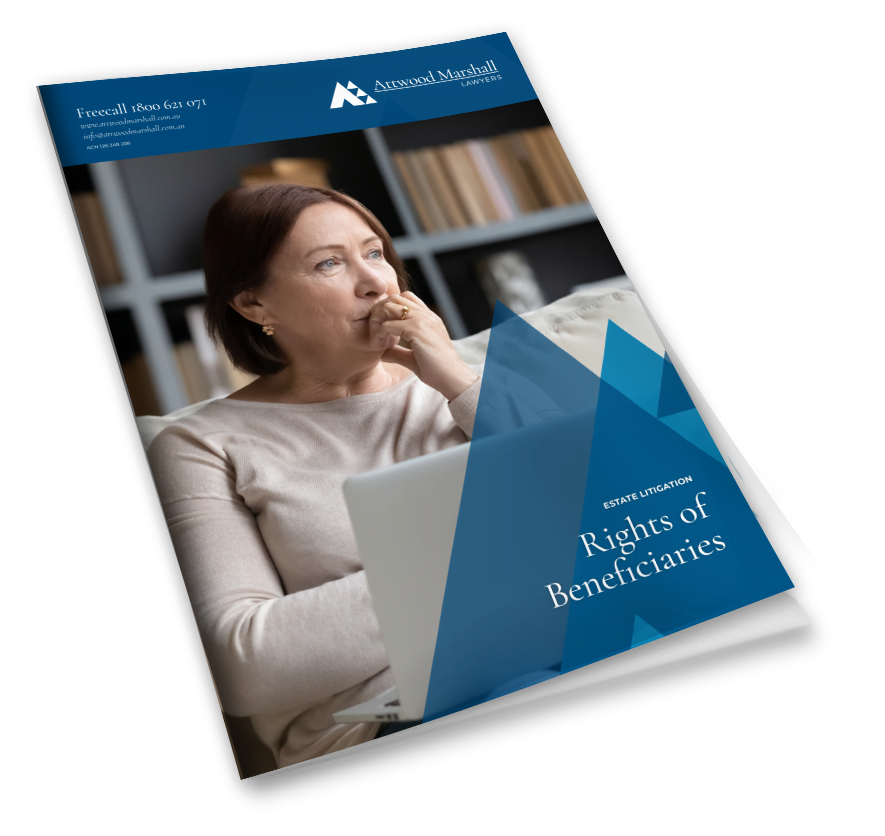Executor & Beneficiary Disputes
Estate Litigation
Resolving disputes between Executors and beneficiaries
Attwood Marshall Lawyers can provide expert advice to assist Executors, Administrators and beneficiaries in resolving disputes effectively and as early as possible to try to avoid the need to go to Court.
It is common for disputes to arise between Executors, Administrators and beneficiaries during the course of an estate administration. Conflict may even occur between appointed Executors. When conflict occurs it can be disastrous for the overall administration of the estate due to amplified stress, increased costs, and resultant delays. We can help you understand the relationship between Executors, Administrators and beneficiaries and your rights, duties and obligations as an Executor, Administrator or beneficiary of an estate.
 Download our Info Pack
Download our Info Pack
For more information about the rights of beneficiaries, simply provide your details and our Information Pack will be sent to your inbox.
FAQs
Are you an Executor/Administrator?
The appointment of an Executor is a very important decision for a Will-maker. The duties of the Executor can be quite onerous. The administration of an Estate often takes a long time to complete in certain scenarios and the tasks required that must be performed can be time-consuming and burdensome. It is usually a gratuitous role. If you have been appointed as an executor of a person’s Will then you can rest assured that that person held you in high regard and placed a great deal of trust in you to ensure that their last wishes are protected and carried out.
An Executor’s duties can include:
- arranging the collection and burial or cremation of the deceased’s body with funeral directors including providing relevant information required to complete the Death Certificate;
- arranging the funeral and wake (if applicable);
- securing the assets of the deceased and attending to any matters required that were in place at the time of death (including looking after any pets or other urgent matters);
- notification of the death to any relevant family members, government departments, banks, service providers and other relevant entities;
- locating the original Will and engaging lawyers to act in the estate;
- obtaining a grant of probate or letters of administration from the Supreme Court;
- calling in the assets of the estate, which can involve extensive investigation in relation to various affairs, including taxation, structuring and acting as trustee of trusts;
- tending to the payment of the deceased’s debts, including funeral and administration expenses;
- defending any litigation or claims made on the estate;
- any other matter that requires a representative’s input on behalf of the estate.
A useful starting point is the nature of the relationship between beneficiaries and executors. An executor stands in a fiduciary relationship to all beneficiaries of the estate. Fiduciary simply means a relationship of trust. This relationship is central to the rights of beneficiaries and the obligations of executors in estates. The executor has been entrusted with the assets of the estate and the power to administer the estate for the benefit of the beneficiaries of the estate. The executor must therefore discharge his or her duties with due care and loyalty to the beneficiaries.
Yes. The Court can award Executor’s commission. This is where a Court remunerates an Executor for their ‘pains and troubles’ during the administration of the estate, provided they have done the right thing in performing their duties and have not acted in a way that would disentitle them from a claim for commission.
Executors are not automatically entitled to commission. Executor’s commission needs to be ordered by a Court. Alternatively, if all residuary beneficiaries in the estate are over 18 years old, then they can all agree on an amount of commission to be paid to the Executor to avoid a Court application. Usually, this agreement is in writing and signed by all parties.
If you are appointed an executor, you should endeavour to keep the beneficiaries updated monthly, at the very least. The beneficiaries should be made aware of any significant developments in the estate as soon as, or shortly after, they occur or are due to occur.
The short answer is yes. It is strongly recommended that you seek legal advice from a specialised lawyer who acts in this area of law and find out what’s involved. There is a great deal of pressure placed upon an executor when carrying out this role, by their family members. Acceptance of this role can come with significant burden.
If you have been appointed as an Executor, you should take proactive steps to educate yourself of your duties, obligations, risks and what is expected of you. If you don’t think you are up for it, then you can renounce and if you decide to take that course, you should consider doing so immediately.
Are you a Beneficiary?
A beneficiary’s right to information in relation to the operation of an estate is historically steeped in English Law which has continued to inform Australian Law.
It has been accepted legal principle for many years that estate documents “belong” to the beneficiaries and are in a sense the property of the beneficiaries. Access to those documents is an entitlement that should not be denied by the executors.
At Attwood Marshall lawyers, we strive to assist you in getting what you are entitled to.
Yes. A beneficiary has a right to receive a copy of the Will and/or inspect the original Will. In all States and Territories, the law compels a person who has possession or control of a Will of a deceased (and this person does not necessarily have to be an executor) to provide a copy of the Will to any person named or mentioned in the Will, upon request.
A beneficiary should be promptly informed of their entitlement under a Will or if there is no Will of their entitlement on the deceased’s intestacy (the rules governing the distribution of an estate in the absence of a Will).
The beneficiary’s right to further information is often dictated by the nature of their interest in the Will. For instance, a beneficiary that holds an interest in a specific asset (for instance a boat or a bank account) has different rights to that of a beneficiary that holds a residual or remainder interest in the estate.
Specific legatee vs residuary beneficiary
A beneficiary that holds an interest in a specific asset (for instance a boat or a bank account) has a right to access information in relation to that specific asset, but generally nothing more. Using the example of a beneficiary that receives a specific gift of a boat under a Will, they are entitled to access information in relation to the boat (such as registration papers etc). They are not strictly speaking entitled to access information in relation to the other assets of the estate, unless there are special circumstances.
The rights of a beneficiary holding a residual or remainder interest in an estate are much broader. As a residuary beneficiary of an estate, the entitlement to access to information extends to information relating to the management and administration of the estate in its entirety.
A beneficiary entitled to an interest in remainder in an estate has a right to access all information about the estate and has a right to see estate documents as it is information about that beneficiary’s own property. As every transaction occurring in the estate will ultimately affect that beneficiary’s interest they are entitled to a full accounting of the estate. In the event that information is withheld the beneficiary can approach the Court to compel the executor to provide the relevant information.
Yes. An interim distribution of the assets of the estate can be made provided the relevant statutory time periods have expired since date of death. For instance, in Queensland, the executor of the estate must wait until at least six months from date of death before making an interim distribution to ensure there are no unknown creditors or liabilities that must be paid.
A beneficiary has a right to be advised of any litigation against the estate that may affect their entitlement under the Will or under the rules of intestacy. An executor or administrator must inform you of any potential or active claims against the estate as soon as is possible. You may be asked to participate in defending the claim, or you may be referred to an independent lawyer to obtain your own advice with respect to the claim.
The timeframe for finalisation of an estate varies in each State and Territory.
The legislation in each State and Territory sets out the relevant statutory time periods an executor must wait and withhold distribution of the estate to ensure that the assets are distributed safely to the beneficiaries.
However, generally, you can expect a simple estate to be finalised between six to 12 months after the death of the deceased, depending on the nature and value of the estate.
Finalisation of the estate may take longer depending on the complexity of the estate or in circumstances where the will is challenged or contested.
FAQs
Please select whether you are an Executor or beneficiary
The appointment of an Executor is a very important decision for a Will-maker.
The duties of the Executor can be quite onerous. The administration of an Estate often takes a long time to complete in certain scenarios and the tasks required that must be performed can be time-consuming and burdensome. It is usually a gratuitous role.
If you have been appointed as an Executor of a person’s Will then you can rest assured that that person held you in high regard and placed a great deal of trust in you to ensure that their last wishes are protected and carried out.
An Executor’s duties can include:
- arranging the collection and burial or cremation of the deceased’s body with funeral directors including providing relevant information required to complete the Death Certificate;
- arranging the funeral and wake (if applicable);
- securing the assets of the deceased and attending to any matters required that were in place at the time of death (including looking after any pets or other urgent matters);
- notification of the death to any relevant family members, government departments, banks, service providers and other relevant entities;
- locating the original Will and engaging lawyers to act in the estate;
- obtaining a grant of probate or letters of administration from the Supreme Court;
- calling in the assets of the estate, which can involve extensive investigation in relation to various affairs, including taxation, structuring and acting as trustee of trusts;
- tending to the payment of the deceased’s debts, including funeral and administration expenses;
- defending any litigation or claims made on the estate;
- any other matter that requires a representative’s input on behalf of the estate.
A useful starting point is the nature of the relationship between beneficiaries and executors. An executor stands in a fiduciary relationship to all beneficiaries of the estate. Fiduciary simply means a relationship of trust. This relationship is central to the rights of beneficiaries and the obligations of executors in estates. The executor has been entrusted with the assets of the estate and the power to administer the estate for the benefit of the beneficiaries of the estate. The executor must therefore discharge his or her duties with due care and loyalty to the beneficiaries.
Yes. The Court can award Executor’s commission. This is where a Court remunerates an Executor for their ‘pains and troubles’ during the administration of the estate, provided they have done the right thing in performing their duties and have not acted in a way that would disentitle them from a claim for commission.
Executors are not automatically entitled to commission. Executor’s commission needs to be ordered by a Court. Alternatively, if all residuary beneficiaries in the estate are over 18 years old, then they can all agree on an amount of commission to be paid to the Executor to avoid a Court application. Usually, this agreement is in writing and signed by all parties.
The short answer is yes. It is strongly recommended that you seek legal advice from a specialised lawyer who acts in this area of law and find out what’s involved. There is a great deal of pressure placed upon an executor when carrying out this role, by their family members. Acceptance of this role can come with significant burden.
If you have been appointed as an Executor, you should take proactive steps to educate yourself of your duties, obligations, risks and what is expected of you. If you don’t think you are up for it, then you can renounce and if you decide to take that course, you should consider doing so immediately.
A beneficiary’s right to information in relation to the operation of an estate is historically steeped in English Law which has continued to inform Australian Law. It has been accepted legal principle for many years that estate documents “belong” to the beneficiaries and are in a sense the property of the beneficiaries. Access to those documents is an entitlement that should not be denied by the Executors.
At Attwood Marshall Lawyers, we strive to assist you in getting what you are entitled to.
Yes. A beneficiary has a right to receive a copy of the Will and/or inspect the original Will. In all States and Territories, the law compels a person who has possession or control of a Will of a deceased (and this person does not necessarily have to be an executor) to provide a copy of the Will to any person named or mentioned in the Will, upon request.
Yes. An interim distribution of the assets of the estate can be made provided the relevant statutory time periods have expired since date of death. For instance, in Queensland, the executor of the estate must wait until at least six months from date of death before making an interim distribution to ensure there are no unknown creditors or liabilities that must be paid.
A beneficiary has a right to be advised of any litigation against the estate that may affect their entitlement under the Will or under the rules of intestacy. An Executor or Administrator must inform you of any potential or active claims against the estate as soon as is possible. You may be asked to participate in defending the claim, or you may be referred to an independent lawyer to obtain your own advice with respect to the claim.
The timeframe for finalisation of an estate varies in each State and Territory.
The legislation in each State and Territory sets out the relevant statutory time periods an executor must wait and withhold distribution of the estate to ensure that the assets are distributed safely to the beneficiaries.
However, generally, you can expect a simple estate to be finalised between six to 12 months after the death of the deceased, depending on the nature and value of the estate.
Finalisation of the estate may take longer depending on the complexity of the estate or in circumstances where the will is challenged or contested.
Meet our Estate Litigation team

Jeff
Garrett

Amanda
Heather

Chloe
Smith

 Download our Info Pack
Download our Info Pack








